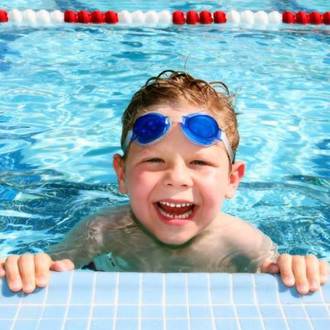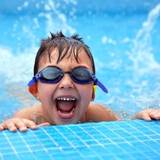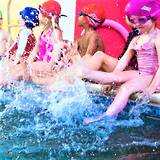Making the most of preschool swimming lessons
|
Learning to swim is such an important life skill for children to learn from a young age and having swimming lessons even before they start school is a great place to start. Here are some expert tips to help you navigate the process, from choosing a swim school and booking lessons to what you can expect from lessons, moving through progressions and everything in between.
|
You might also be interested in ...
Keeping kids safe around water
Water play can be a great source of fun and exercise for the whole family, but it can also be dangerous for kids if the proper water safety precautions are not taken. The good news is though there are many ways to keep children safe in and around water. Check out these helpful tips.
Teaching young kids the swimming kick
Learning how to kick in water correctly will help your kids to swim more efficiently in the future and will help to lay the foundation for other swimming strokes too. Kicking is a gross motor skill and a critical swimming skill, but it can be hard work at first and will require some concentration to get it right and for your kids to stay afloat.







Learning to swim is such an important life skill for children to learn from a young age and having swimming lessons even before they start school is a great place to start.
Swimming lessons should be a positive learning experience for your preschooler and as a parent you should feel fully informed and involved in the learning process too.
Making the most of preschool swimming lessons
1. Finding a swim school
Before signing your preschooler up for swimming lessons, research different swim schools.
Do they have clear progression pathways? What qualifications do the instructors hold?
Ask if you can’t find the information.
2. Booking lessons
Find an instructor that works for your child’s personality. Ask questions and explain your preschooler's needs and learning style.
Commit for a fair period of time. Children that attend sporadically have a slower rate of progress. The best learning happens with a consistent approach.
Check how the swim school incorporates water safety into their lessons. These are fundamental skills that could one day save your child's life.
3. Attending swimming lessons
Try to arrive at lessons in a positive way and with plenty of time.
As in any learning environment, being positive and relaxed is important. If you are stressed your preschooler will be as well. Feeling unsettled will markedly slow their learning process and skill acquisition.
Check in with the instructor before or after the lesson. They may not have a lot of time between lessons, but they do want a positive relationship with you and to see your preschooler progress.
You know your kids best, so share helpful information. It will assist the instructor in building a stronger relationship and allow for faster progress during lessons.
If you have a question or you're unsure of your preschooler’s progress, ASK. If you need more time than the instructor has available call into the office or look for a supervisor poolside.
Swim schools want your child to improve so if something isn’t working for you ask the question.
4. Swimming progressions
Whether your preschooler is a beginner or has had some previous swimming experience, they will fit within the progressions outlined below.
Children learn at their own pace, so try not to put expectations on achieving a skill or level in a specific timeframe.
Before formal swimming strokes are taught, a positive relationship between your preschooler and the water needs to be nurtured. Activities are carefully selected to encourage a positive relationship with the water.
For example in a beginner class passing a ball while standing is increasing your child's confidence as they participate in the activity while managing the splashes the ball makes.
Like any skill, swimming and water safety skills take time and practice to master. Roughly ninety correctly performed repetitions of a particular skill are required to complete a learning pathway.
Swimming strokes are taught through progressions. Key skills taught build on each other to create a formal swimming stroke. When one skill is achieved the next skill is added in.
When skills are skipped through too quickly and a child isn’t allowed the time they need to learn (for example kicking and stroking at the same time) progress can be impaired later on.
Skill progression is achieved through many different teaching methods and a good instructor will be able to adjust and use different teaching methods to best suit the needs of each student.
All of the below progressions are important in your preschooler's development and should be taught concurrently on both the front and back.
Confidence
Submersion
Floating
Gliding
Kicking
Arms
Breathing
5. Long term investment
If you do nothing else, invest in your children and ensure they learn to swim from an early age.
Make it happen in whatever capacity you can, there are many options so find one that works for your family.
Learning to swim is a life skill, it opens up endless opportunities to pursue water related recreation and most importantly it teaches core water safety skills that could one day save your child's life.
More kids swimming articles to enjoy:
Source: This article was written by Kew Taggart the Acting Programme and Activity Leader, Western Area for Christchurch City Council. She has over 15 years of experience as a learn to swim instructor, swim coach and swim school manager in the South Island.
Swimsmart is Christchurch City Council's learn to swim programme. Tap into the benefits of aquatic activities for a lifetime. With Swimsmart you and your family can gain confidence and enjoyment in the water.